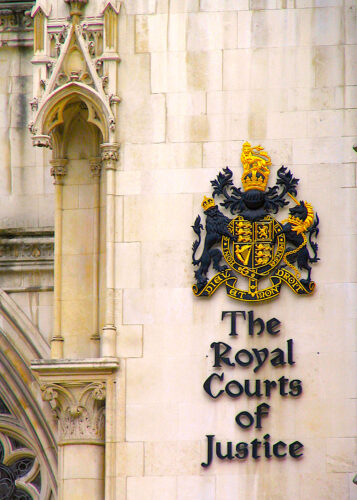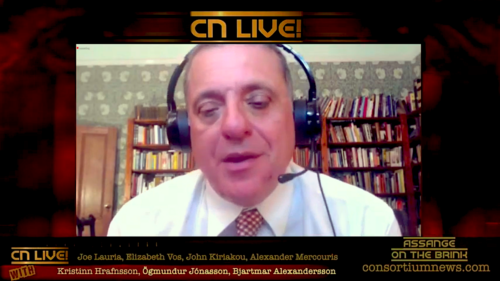The High Court in London has accepted new evidence in the U.S. appeal of the decision not to extradite Julian Assange, which almost never happens, says CN legal analyst Alexander Mercouris.

The Gallery inside the Royal Courts of Justice, where the High Court is housed. (Royal Courts of Justice)
By Joe Lauria
Special to Consortium News
Appeals courts examine how the law was applied to the existing evidence from a lower court and on only the rarest occasions will they consider new evidence.
One instance in which they might is after a murder trial when someone else credibly confesses to the crime, impacting the appeal of a homicide conviction, but even that rarely happens.
And yet the High Court in London last week decided to accept new evidence from the United States in the extradition case of Julian Assange, the imprisoned WikiLeaks publisher.
The High Court has allowed only the narrowest avenue of appeal: namely on the question of prison conditions in the United States. District Judge Vanessa Baraitser denied the U.S. extradition request based on Assange’s mental state and the onerous conditions of solitary confinement in the U.S., which she ruled combined to put Assange at high risk of suicide.
To win its right to appeal, the U.S. submitted to the High Court that it would not put Assange under Special Administrative Measures (SAMS) — or extreme isolation — and if his conviction survives the appeals process could serve his sentence in a more humane prison in Australia. Somehow, the High Court granted the U.S. leave to appeal by accepting this new evidence, which the U.S. could have easily been put forward in the five-week extradition hearing.
“The grounds of appeal as reported make no sense to me since they most definitely are new evidence, and are indeed evidence which the U.S. government had every opportunity to present to Baraitser during the hearing,” said Consortium News legal analyst Alexander Mercouris in an interview. “None of the excuses for not doing so make sense to me.” Also lacking sense is why the High Court would even accept this new evidence, he said.
“Whilst an appeal Court does have discretion to hear new evidence, to my knowledge the circumstances where it would agree to do this is extremely rare,” Mercouris said.
One Case
“I worked in the Royal Courts of Justice for 12 years and I can think of only one case where that happened,” he said. “That was a case when evidence came to light after a trial, that the judge had had an undisclosed relationship with the party in the case to whom he awarded judgment. That was evidence which obviously had bearing on the judge’s decision, and which the judge had himself failed to disclose during the trial, and for that reason the appeal court agreed to consider it.
“In general it would have to be new evidence of that sort of nature for the appeal court to agree to consider it,” Mercouris said. The evidence offered by the U.S. does not rise to that standard, he said.
“I cannot see any such justification for the High Court agreeing to consider this new evidence. On the contrary, this looks to me like exactly the sort of evidence which an appeal should refuse to consider,” he said.
Mercouris said the U.S. was certainly aware that Assange’s lawyers were intending to bring up issues relating to his health and the effect that being in a U.S. prison would have on his health. “It is well known that extradition cases have failed because the High Court was not satisfied about the prison conditions and their potential effect on a suspect’s health in the country which is seeking his extradition,” he said.
“This is an entirely routine issue in extradition cases, and the U.S. authorities should have readied themselves to respond to it in Assange’s case,” Mercouris said. “If they did not do so, then that is their fault, not Baraitser’s fault, and Baraitser cannot therefore be blamed because she made a decision without taking this evidence into account, which the U.S. could have presented to her, but which it failed to do.”
Mercouris added: “It is essential to remember that in an appeal the question is no longer which party in a case is right; it is whether the judge did anything wrong.”
As he pointed out on CN Live! last Friday, the U.S. has in effect now admitted to the inhumane conditions of its prisons and therefore Baraitser was right not to send Assange to one of them. “An appeal is when a judge gets it wrong, not when a judge gets it right,” he said.
So the question remains: why did the High Court accept this new evidence and give the U.S. the right to appeal? Mercouris sets out three possibilities:
(1) The appeal is hopeless and the High Court knows it, but it is nervous of simply refusing an Appellant as powerful permission to appeal, so it has granted permission to appeal to give the US government its day in Court. In that case this is all a formality and the High Court will hear the appeal, probably in November, and then move to dismiss it.
(2) The US government’s appeal is hopeless and the High Court knows it, but it is granting permission to appeal in order to give Assange’s lawyers an opportunity to pursue a cross appeal on the very serious issues that they have said they might decide to bring.
(3) The proceedings are a sham, and a decision has been made to extradite Assange, and to allow the appeal, so permission to appeal was granted on flimsy grounds simply to provide a legal fig leaf for a decision which has already been made.
“I know that there are many people who think (3) but all my experience and training recoils from it, and until I see it happen I won’t believe it,” Mercouris said.
Joe Lauria is editor-in-chief of Consortium News and a former UN correspondent for The Wall Street Journal, Boston Globe, and numerous other newspapers. He was an investigative reporter for the Sunday Times of London and began his professional career as a stringer for The New York Times. He can be reached at [email protected] and followed on Twitter @unjoe




The United States changing it’s direction on how they will put Assange in Prison hardly qualifies as new evidence ! You know that Joe but you are such a hard core Leftist you are too blind to see it !!!
Magistrate Vanessa Baraitser ruled against extraditing Assange based on his health and the conditions of U.S. prisons. Evidence of the prison conditions was vital to her decision. Any evidence related to those conditions was crucial for her to know before she made her ruling. During the hearing, the U.S. did not provide evidence that it would not put Assange in Special Administrative Measures and would allow him to serve his sentence in Australia. That may have been crucial evidence to sway Baraitser. But that evidence was never presented to the lower court. Instead that evidence was presented to the High Court on appeal. Of course it is new evidence, which an appeals court rarely accepts unless it so orders.
Unfortunately, it will be 3.
They hardly ever bother with the fig leaves any more.
TEP.
As an attorney for 45 years I can tell you that what the US presented is not “new evidence”. It does not fit into the new evidence rule.
What it is is a glaring admission that US prisons are gulags.
and that itself should vitiate any claims of new evidence.
It’s not news, but it is new evidence in that it was not presented during the hearing of the lower court.
1. Conflict of interest Baraitser. Contacts with US militairy office. She knows.
2. She knows mostly sure about new evidence that a fbi member, a psychopat, lies in court about Wiki Leaks and collaboration aso. This aused the imprisonment of Assange.
3. Half year already the apeal was accepted and yet now no date is planned. So UK and US keep Assange extra longtime jailed solitairy, which is absolutley not necessary By delay Assange without medical care may die in prison. And that is barbarian behavior of US and UK.
The Magna Carta is a document constituting a fundamental guarantee of rights and privileges. It is regarded by both the UK and the USA, even today, as the backbone on which so many laws have been constructed.
All that started in the year 1215.
But when English Courts bow down to the pressure of the US, as in the case of the Julian Assange show trial adding even further to his continued illegal imprisonment, you know that those great values can be re-arranged to suit the pressure that the arrogant US seems to think it has over the whole world, reflected in the issuance of sanctions at their whim for commercial or military purposes, non-stop wars to suit their lust for power and now, to the disgust shown by the majority of decent countries, seeing that corrupt influence spread into a legal system once regarded by all as almost sacred.
It shows clearly the disregard that the US has for any value, any tradition not of its making. But it also shows that even the British are prepared to submit to the dictates of such a disrespected bully in the 21st century.
Now that’s the real crime that has occurred this week. The other crime is what the USA is fast becoming as its empire crumbles from within.
Without respect, a country has no future.
The Magna Carta was a piece of paper. Assange is flesh and blood. Give me actions not words, or else he’s doomed.
You’re a good man and an excellent journalist, but also
a “doubting Thomas.”
Silly me. I thought the “new evidence” they were going to admit is the confession of the U.S.’s key witness that the CIA had bribed him. They should be considering that new evidence.
It was the FBI that granted Thordarson immunity, not the CIA. (For a change.)
I believe that the only US govt organisation that can grant legal immunity from federal prosecution is the dept of justice. The FBI relayed this offer.
Richard’s Axiom: “The law is a fraud. There is no law. What there is, is POWER. Power crushes “law” every time. There are no exceptions”.